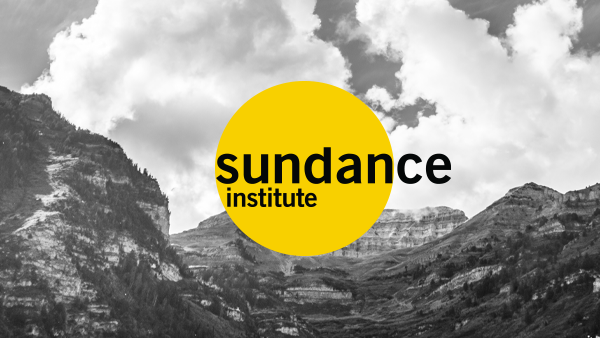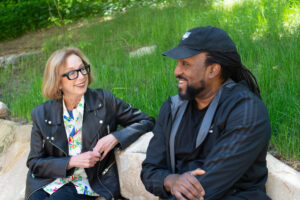Kirsten Johnson
As a movie lover, the thought crossed my mind that during the 14-hour flight from New York to Abu Dhabi, I could watch at least seven films (I’ve done it before). But as I was headed to the Abu Dhabi Film Festival and the first-ever meetings of documentary grantees of AFAC, aka the Arab Art and Culture Fund, I figured I’d better pace myself. Delighted to find Fatih Akin’s latest movie, Soul Kitchen, I watched just that and then slept the rest of the way. I needed that rest, because once I met the AFAC crew there was no more time for sleep!
I had been invited to be an advisor at the first-ever AFAC workshop by Cara Mertes, director of Sundance Institute’s Documentary Film Program. She has been advising AFAC on their documentary initiative and learned from me that I was attending the Abu Dhabi Film Festival with The Oath, a film that was supported in development and production by Sundance Institute. Cara has been working with AFAC since 2009 on their funding, workshops, and overall planning for supporting Arab filmmakers working in the Middle East.
Now I had two reasons to head to Abu Dhabi-the premiere and the workshop. Our first AFAC get-together took place in the Lebanese restaurant in the Hilton Hotel where we were all staying. The others had already gathered before my flight landed, and I walked in to an impressive spread of people and food.
Before I knew it, Oussama al Rihafi, the new executive director of AFAC, proved himself to be the most generous of hosts, and early on he let me know that I could only eat better Lebanese food if I came to visit him in Beirut. One end of the table was speaking Arabic and my end was speaking English, but I quickly discovered that by adding French to the mix, I could communicate directly with everyone, and soon we were all heatedly discussing Olivier Assayas’s Carlos and Barbet Schroeder’s Terror’s Advocate. Maybe I’d flown half way around the world, but once again, I’d found my people!
That idea was further confirmed the next morning at a panel we all attended on Middle Eastern Documentary Production produced for The Circle, an industry-focused set of panels that is part of the Abu Dhabi Film Festival. On stage with several other panelists was the relaxed and hilarious Orwa Nyrabia, who besides being a filmmaker, runs a new documentary festival in Syria called Dox Box with his collaborator, Diana El Jeiroudi.
In the midst of a discussion of all the limitations facing independent documentary filmmakers in the Middle East, Orwa kept his focus on the importance of the community of filmmakers and how we as friends had to encourage each other to make the kind of films each of us needs to.
Later in the afternoon when I met him for the first time, he said “Oh I know you!” Puzzled, I said “You do?” And he said, “Oh yes, you are the one in the audience with the long neck who kept lifting your chin up to hear me when I was on the stage. I could see you listening and I knew you were already a friend.”
The one “stretching my neck” – was me alright! I was reminded of how much of a back and forth there is in the life of filmmakers – we are as much the watchers of films as we are the makers, the listeners as much as the storytellers. I loved learning that my audience participation felt like camaraderie to Orwa when he was up on the stage.
The Abu Dhabi Film Festival, and our workshop, was based in the Emirates Palace Hotel (a seven-star hotel—that’s a whole other story!), and the meeting place for the AFAC team and other filmmakers was a luminous tented building just outside the hotel, facing the water.
You leave the cool vaulted spaces and escalators of the hotel, walk out onto a marble terrace that reflects the blindingly bright sun and oven-quality heat, and there’s an expansive beach of flat sand and ocean beyond. You have 30 seconds to take it all in before it’s just too hot to be outside any longer and into the tent building you go. That’s where we spent the rest of the afternoon. By then we had all had enough time to hear about each other’s projects, so conversations were flying fast and furious and it was getting hard to stop them for the programmed events.
One of those programmed events was my presentation. I had imagined I would be speaking to a group of people I didn’t know, but I already felt like I was at a dinner party with a bunch of friends. Besides the work I am doing as a cinematographer on a range of ongoing documentaries, I’ve recently been shooting a film in Afghanistan that I’m currently editing. The concerns that come with making this film were mirrored in the range of subject matter, formal approaches, production questions, and shooting dilemmas that all of the AFAC grantees are facing as they take on their films.
Just to sample: Karima is working to address the constraints on women who use cameras in Morocco, Habib is using humor to explore the extremist religious agenda behind the urban myth of a man on a motor scooter who slashes women’s backsides with a razorblade if they are dressed too provocatively in Tunisia, and Regine is trying to figure out how to convey the violence of Algerian history.
Laila’s editing together three different styles of footage to invoke three decades of imprisonment, and Ahmed, who’s gone from being a fixer to a documentary director in one leap, is now ready to make the narrative version of his film Living Skin about kids working in the toxic tanneries of Cairo. Hachemi is looking for a populist way to understand Algerian-Japanese relations through theater and construction workers, and Dima is thinking through what kind of materials she will use to build architectural models of people’s memories of their destroyed Palestinian village. Suffice it to say, we all had a lot to talk about!
Just when I thought I couldn’t get more excited about everyone’s amazing projects, we were joined by more filmmakers who were a part of SANAD, the brand new workshop being run out of the Abu Dhabi Film Festival, which Oussama had decided to coordinate with for the first AFAC workshop. The improvisational spirit of my presentation and the discussion that followed only expanded when they joined us, and we all became a part of the first big gathering of regional Arab filmmakers participating in inaugural workshops.
We were all riveted the next morning when director Laura Poitras gave her Advisor presentation. She, too, had been invited by Cara as an Advisor to AFAC. Although it has been my great honor to work with her as a co-cinematographer on The Oath, it was the first time I had heard her explore the methodology behind her previous film, My Country, My Country, which she shot in Iraq, as well as some new work she is doing.
The Oath was screening at the Abu Dhabi Film Festival, but not until later that night, so by the time Laura had finished her presentation the whole AFAC grantee group was asking her if they couldn’t just watch the whole film right away once she’d shown them excerpts. Laura stood firm—everyone would have to come to the Marina Mall to see the film in the multiplex that night!
After our one-on-one Advisor-grantee meetings that lasted throughout the afternoon, we all headed to the mall—even Regine, who had twisted her ankle in between and made it in a wheelchair pushed by Laila! The upscale mall almost could have been in any city in the United States, except it was populated by an Emirati population of men in white and women in black.
Laura and I imagined that the 400-seat theater would be a sea of black and white. Instead, the audience that showed up was a largely international one, with a smattering of UAE nationals in the crowd. It was the Middle Eastern premiere of The Oath, and it was truly gratifying to hear several Arab journalists speaking with Laura after the screening express how they’d come into the theater expecting to be disappointed and instead had emerged knocked out by the film.
The next morning, the third of our advisor trio, Khalil Benkirane, gave his fascinating presentation about his experience as a filmmaker, festival curator, and programmer of Arab and Middle Eastern films. In his presentation that evoked the many strong national cinema traditions that have existed for decades, Khalil indicated how isolated documentary filmmakers have been throughout the Middle East until only the last few years.
What was becoming clear to me after these few intense days of conversations is that documentary filmmaking is on the cusp of an incredible expansion in the Middle East, and Sundance Institute and AFAC are leading the charge. These AFAC grantees are the first group of documentary filmmakers to be receiving Middle Eastern-based NGO financial support for their projects, and although several of the filmmakers have been making documentaries for years and others were making their very first, it felt like I was witnessing and participating in one of the seminal moments of a new generation and community of documentary filmmakers in the region.
The specificity of the worlds each of these filmmakers inhabit and express is going to be a great contribution to our global movie theater. What I told everyone was that I truly can’t wait to see their films! We are already scheming about a workshop for Middle Eastern camerawomen in Syria in 2011…




